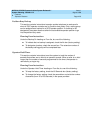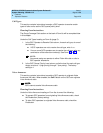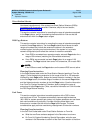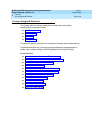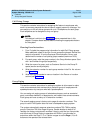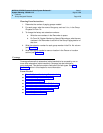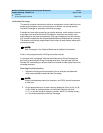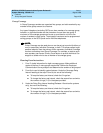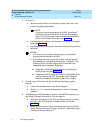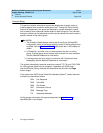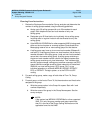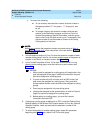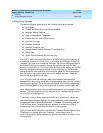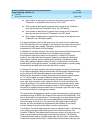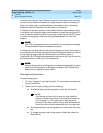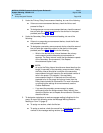
MERLIN LEGENDCommunications System Release 6.1
System Planning
555-661-112
Issue 1
August 1998
Features
Page 4-31Group-Assigned Features
4
4. On Form 7c:
a. Write the group number in the Group No. space. Start with
1 and
number the groups sequentially.
NOTE:
If a group is the coverage group for AUDIX Voice Power
1
(the factory setting is Group No. 30 but can be changed),
write
AUDIX by the group number and list the extensions of
AUDIX Voice Power subscribers (see Form 2a).
b. List the extension numbers of all senders in the group in the upper
block (see Form 2a).
c. List the receivers for the group in the lower block by doing one of the
following:
NOTES:
1. If you have not yet created calling groups, you must defer
naming them as receivers until later.
2. If the system includes a voice mail system, see that system’s
documentation for completing the receivers. In addition, if the
system is part of a private network with Centralized Voice
Messaging, see the
Network Reference
.
■ Designate a calling group as a receiver by checking the
Calling Group box (see Form 7d).
■ Designate the QCC queue as a receiver (Hybrid/PBX mode
only) by checking the QCC Queue box and/or listing the
extension numbers of all receivers (maximum of eight).
5. On each copy of Forms 4b, 4d, 5a, and 5b that describes a specific
receiver:
a. Locate an available button on the Button Diagram.
b. Write
Group Cover and the coverage group number in the space
available.
6. If designating the QCC Queue as a receiver (Hybrid/PBX mode only), on
the Group Coverage Calls table on Form 6a (page 2):
a. Write the extension(s) for the QCC operator position(s) to receive
the calls in the QCC Operator to Receive Calls column (see
Form 2a).
b. Write the priority level for each coverage group’s calls in the QCC
Queue Priority Level column. Assign a value of 1 (highest) through 7
(lowest); the factory setting is 4.
1. No longer orderable.



